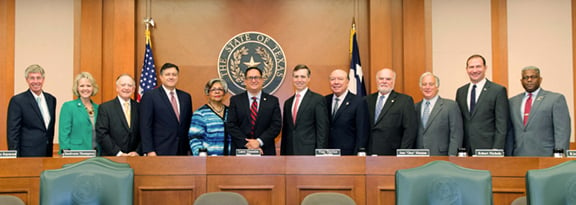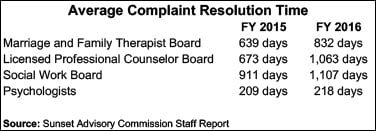Texas Legislature
Austin lawmakers push bill to alleviate fentanyl crisis
Lawmakers weigh axing Project Connect’s ‘blank check’ loophole
Legislation would bar appraisal district lawsuits against property owners
Texas Sunshine Coalition seeks greater transparency
Boards of Examiners Ripped for Backlogs
Boards of Examiners Ripped for Backlogs
Sunset Review rough for boards that license and regulate
professionals who play key roles in child-custody cases
by Ken Martin
© The Austin Bulldog 2016
Part 6 in a Series
Posted Friday December 16, 2016 10:39am
The Austin Bulldog’s investigation of problems in family law courts involving child-custody cases includes a review of complaints against some of the professionals appointed by courts to provide related services. Specific complaints will be detailed in later installments of this ongoing series. An overarching question is why does it take two or three years to resolve complaints against these practitioners? The answer was revealed in the biennial exercise known as Sunset in Texas, which is now underway.
Sunset in Texas is not the romantic experience the name might imply. It’s not a time for kicking back, sipping a beer, and watching the sun dip into the chilly waters of Lake Travis. Sunset in Texas is a time for a deep and probing examination of a good portion of the 130-odd Texas governmental agencies to learn how well they are performing. It’s a time for determining whether the sun should set on their work and deciding if these agencies should fade into history.
Although the Sunset process for the 2016-2017 cycle is scrutinizing 25 separate agencies, this story will focus solely on the four professions whose services are utilized to varying degrees in family law cases involving child custody: Professional Counselors, Psychologists, Social Workers, and Marriage and Family Therapists.
Practitioners in each of these professions are licensed and regulated by a separate Texas State Boards of Examiners. Each of these boards will be abolished unless lawmakers reauthorize them in the 85th Session of the Texas Legislature that convenes January 20.
As with all agencies now under review, if these four are reauthorized they could be radically reformed. They could also be moved under the umbrella of a different state agency.
Three of these Boards of Examiners—for Professional Counselors, Social Workers, and Marriage and Family Therapists, which collectively oversee some 50,000 licensees—currently receive administrative support from the Texas Department of State Health Services (DSHS).
It’s apparent these three boards will not be left to continue floundering as they have been, based on the scathing review of their performance aired during a December 8 hearing of the Sunset Advisory Commission. Under the current operating procedures and with insufficient staff support from DSHS, they have not kept up with the workload. The backlog of unresolved complaints against the professionals they regulate has grown exponentially in recent years.
 During Fiscal Years 2000 through 2006, the average length of time for these three boards to resolve complaints rarely exceeded 200 days. But since FY 2007 the length of time needed to resolve complaints has been rising steadily and now stands at 2.3 years for marriage and family therapists, 2.9 years for professional counselors, and 3 years for social workers.
During Fiscal Years 2000 through 2006, the average length of time for these three boards to resolve complaints rarely exceeded 200 days. But since FY 2007 the length of time needed to resolve complaints has been rising steadily and now stands at 2.3 years for marriage and family therapists, 2.9 years for professional counselors, and 3 years for social workers.
These delays fail to protect the health and safety of Texans—many of whom are struggling with litigation and mental stress. The delays also soil the reputation of practitioners who may have been wrongfully accused of misconduct and would like a timely opportunity to clear their names.
The Sunset Advisory Commission Staff Report recommended that the Board of Examiners of Professional Counselors, Social Workers, and Marriage and Family Therapists all be transferred to the Texas Department of Licensing and Regulation (TDLR) by August 31, 2018.
In addition the staff report recommended that the boards’ complaints and ethics committees be abolished, that board members not be involved in investigating complaints, and that TDLR develops a policy for prioritizing complaints and updates enforcement plans. In addition the report calls for throwing a wider net when checking the backgrounds for licensure applicants to include fingerprints and checks for disciplinary actions taken in other states.
Psychologist examiners board excels
Ethics Reforms an Ongoing Struggle
Ethics Reforms an Ongoing Struggle
Win some, lose some in the sausage
making of the Texas Legislature
by Ken Martin
© The Austin Bulldog 2015
Posted September 22, 2015 2:49pm
The TV cameras and press coverage of presentations at the annual conference hosted by the Freedom of Information Foundation of Texas September 17 focused heavily on a session featuring Wallace L. Hall Jr., the embattled regent of the University of Texas System, who was interviewed by Ross Ramsey, executive editor of the Texas Tribune.
Hall is big news, after all. His open-records crusade to investigate the flagship UT Austin campus triggered Travis County grand jury proceedings against him as well as attempts to impeach, neither of which were successful.
The other important discussions at the conference drew no coverage, as they involved no flashy controversial issues that dominate headlines. Instead they centered on more mundane but vital ongoing struggles to improve ethics and financial disclosures by public officials—meat and potatoes issues fundamental to open government.
 An important panel discussion among two members of the Texas Ethics Commission board and a state representative who pushed the Commission’s legislative agenda in the last session was moderated by Texas Tribune editor Emily Ramshaw. The discussion covered the Commission’s weak enforcement powers, improved registration and reporting by state lobbyists paid to influence legislation and regulations, and the unhappy influence of so-called “dark money” spent to tilt election outcomes without reporting who contributed the funding.
An important panel discussion among two members of the Texas Ethics Commission board and a state representative who pushed the Commission’s legislative agenda in the last session was moderated by Texas Tribune editor Emily Ramshaw. The discussion covered the Commission’s weak enforcement powers, improved registration and reporting by state lobbyists paid to influence legislation and regulations, and the unhappy influence of so-called “dark money” spent to tilt election outcomes without reporting who contributed the funding.
 Attorney Jim Clancy, president of the Corpus Christi-based law firm Branscomb PC, is a former chairman and still a board member of the Commission. He was appointed by then Governor Rick Perry.
Attorney Jim Clancy, president of the Corpus Christi-based law firm Branscomb PC, is a former chairman and still a board member of the Commission. He was appointed by then Governor Rick Perry.
Clancy said lawmakers considering proposed ethics legislation “are not looking at what the public needs but what your next opponent will do.”
He advocates overhauling the state-mandated Personal Financial Statements required of state and local officeholders (and the Austin city manager and city attorney) by Local Government Code Chapter 145. “The reason why we disclose personal assets is to identify conflicts of interest.”
Ethics Bills Faces Complex Dynamics
Ethics Bills Face Complex Dynamics
Open government legislation would move public
official investigations, open financial reports
by Mark Henricks
© The Austin Bulldog 2015
Part 4 in a Series
Posted Monday April 20, 2015 2:42pm
Although some proposed legislation in the current session promises to improve public access to information, a tangled web of factors including fear of the unknown and lack of a major scandal will likely keep state legislators from enacting major open government and ethics legislation.
 That was the consensus of participants in a panel discussion on Legislative Developments held April 9, 2015, as part of the City of Austin’s Open Government Symposium. Moderator, Cary Grace, an assistant city attorney and interim deputy officer of the city’s Intergovernmental Relations Office, was joined by panelists Tim Sorrells, former general counsel of the Texas Ethics Commission, and Denise Davis, former chief of staff to Texas House Speaker Joe Straus and currently a lobbyist and partner in law firm Davis Kaufman.
That was the consensus of participants in a panel discussion on Legislative Developments held April 9, 2015, as part of the City of Austin’s Open Government Symposium. Moderator, Cary Grace, an assistant city attorney and interim deputy officer of the city’s Intergovernmental Relations Office, was joined by panelists Tim Sorrells, former general counsel of the Texas Ethics Commission, and Denise Davis, former chief of staff to Texas House Speaker Joe Straus and currently a lobbyist and partner in law firm Davis Kaufman.
Davis, who also formerly served as parliamentarian and special counsel to the Texas House of Representatives, said new members often arrive in the Capitol intending to pass ethics legislation but most waver because of worries about potential unintended consequences of new ethics laws.
The specter of possibly having to back-pedal on proposals or even wind up lobbying to kill their own bills generally scares them off for good, she said. “You don’t want to be the person that has killed an ethics bill,” Davis explained. “That's the kind of thing that gets you on 10 worst lists.”
Attorney Sorrells spent 12 years at the Texas Ethics Commission, which among other things advises legislators about the propriety of actions they are considering. He said that the attitude about ethical behavior among legislators is that unless something is being done secretly, it is probably acceptable. “The way it’s working in Texas is, you can do it as long as you tell somebody about it,” he said.
Legislators’ comfort with that attitude, coupled with unwillingness to initiate legislation that could require more rules, means no major change can be expected in Texas open government laws unless something happens to spur it, Sorrells said. Legislators tend to be reactive rather than proactive when it comes to ethics and open government legislation. As an example, he pointed to the 1971 Sharpstown stock fraud scandal. That episode produced federal criminal charges against the attorney general and state insurance commissioner and allegations of bribery that went all the way to the governor’s office.
Sharpstown scandal triggered reforms
Do You Want Open Government?
Want More Open Government?
Key lawmaker and nonprofit advocacy group
pitch for public support on pending legislation
by Ken Martin
© The Austin Bulldog 2015
Posted Thursday March 19, 2015 3:01pm
 State Representative Todd Hunter (R-Corpus Christi), who chairs the powerful House Calendars Committee, and the two co-chairs of the Freedom of Information Foundation of Texas laid out the details of proposed legislation that the press and other open government advocates hope will succeed. And some they wish are tossed into the trash heap.
State Representative Todd Hunter (R-Corpus Christi), who chairs the powerful House Calendars Committee, and the two co-chairs of the Freedom of Information Foundation of Texas laid out the details of proposed legislation that the press and other open government advocates hope will succeed. And some they wish are tossed into the trash heap.
Among the array of proposed legislation are bills that if enacted would:
• Empower governmental agencies to compel public officials to turn over records that constitute public information,
• Make public the records of campus police at private institutions of higher education,
• Reemphasize that journalists may legally report on whistleblower allegations of public concern,
• Raise the bar for closing juvenile courts to the public,
• Remove public notices from printed newspapers,
• Disregard public information requests from non-Texans, and
• Authorize the Texas Attorney General to prosecute violations of the Texas Open Meetings Act or Texas Public Information Act when local county and district attorneys decline to do so.
Hunter, who has served eight terms in the Texas House, four as a Democrat and four as a Republican, authored two of these proposed bills.







